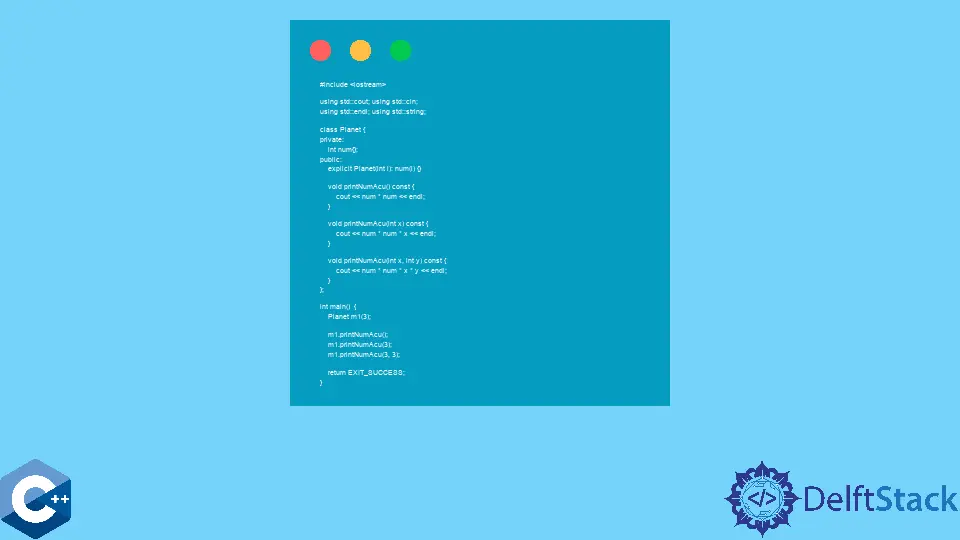C++ 中的函式過載 VS 覆蓋
Jinku Hu
2023年10月12日
C++
C++ Function

本文將介紹 C++ 中函式過載 VS 覆蓋的區別。
在 C++ 中使用函式過載定義具有不同引數列表的多個函式
函式過載是 C++ 語言的特性,可以有多個同名、不同引數且位於一個作用域內的函式。通常,過載函式執行非常相似的操作,為它們定義單個函式名稱並公開具有多個引數集的介面是很直觀的。在本例中,我們定義了一個名為 Planet 的類,其中包含三個名為 printNumAcu 的函式。所有這些函式都有不同的引數,它們在編譯時是有區別的。請注意,過載函式必須具有不同的引數型別或不同數量的引數。
#include <iostream>
using std::cin;
using std::cout;
using std::endl;
using std::string;
class Planet {
private:
int num{};
public:
explicit Planet(int i) : num(i) {}
void printNumAcu() const { cout << num * num << endl; }
void printNumAcu(int x) const { cout << num * num * x << endl; }
void printNumAcu(int x, int y) const { cout << num * num * x * y << endl; }
};
int main() {
Planet m1(3);
m1.printNumAcu();
m1.printNumAcu(3);
m1.printNumAcu(3, 3);
return EXIT_SUCCESS;
}
輸出:
9
27
81
在 C++ 中使用函式覆蓋重新定義派生類中的繼承成員
函式覆蓋是與派生類及其繼承相關的功能。通常,派生類繼承所有基類成員,有些會在派生類中重新定義以實現自定義例程。但是請注意,基類需要指定應該被覆蓋的成員函式。這些成員函式被稱為虛擬函式並且在定義中也包含關鍵字 virtual。還有一個純虛擬函式的概念,它是一種不需要定義的虛擬函式。包含或繼承(不覆蓋)純虛擬函式的類稱為抽象基類,它們通常不應用於建立物件,而是派生其他類。
#include <iostream>
using std::cin;
using std::cout;
using std::endl;
using std::string;
class Planet {
protected:
int num{};
public:
explicit Planet(int i) : num(i) {}
virtual void printName() = 0;
};
class Mars : public Planet {
public:
explicit Mars(int i) : Planet(i) {}
void printName() override { cout << "Name's Mars " << num << endl; }
};
class Earth : public Mars {
public:
explicit Earth(int i) : Mars(i) {}
void printName() override { cout << "Name's Earth " << num << endl; }
};
int main() {
Earth e1(3);
e1.printName();
Mars m1 = e1;
m1.printName();
return EXIT_SUCCESS;
}
輸出:
Name's Earth 3
Name's Mars 3
Enjoying our tutorials? Subscribe to DelftStack on YouTube to support us in creating more high-quality video guides. Subscribe
作者: Jinku Hu
